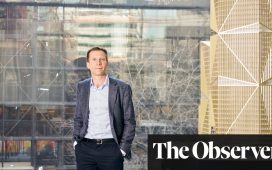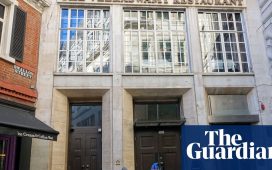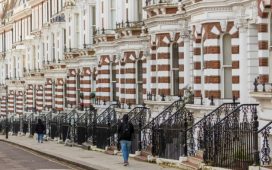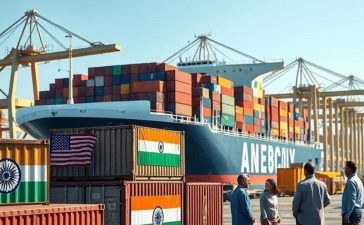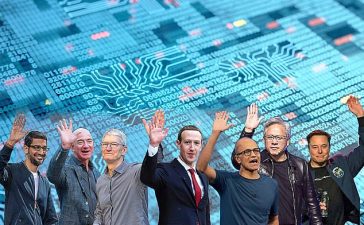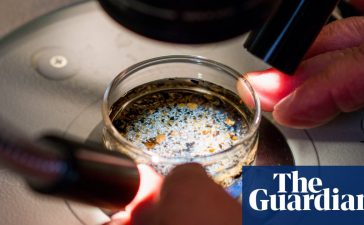In a way, it’s a story as old as time: ultra-wealthy figures pouring a flood of money into city politics in an effort to shape the way it is run.
Still, the political-influence machine that tech billionaires and venture capitalists have recently built in San Francisco stands out for its size and ambition. A new analysis of campaign filings, non-profit records and political contributions by the Guardian and Mission Local reveals the extent of this network, which is using its financial and organizational muscle to push the famously progressive city into adopting policies that are tougher on crime and homelessness, and more favorable to business and housing construction.
In the past six years, prominent tech and venture capital leaders – including the hedge fund manager William Oberndorf, the billionaire investor Michael Moritz, the cryptocurrency booster Chris Larsen, the PayPal co-founder David Sacks, the Y Combinator CEO, Garry Tan, and the Pantheon CEO, Zachary Rosen – have invested at least $5.7m into reshaping San Francisco’s policies, according to the analysis of public data. Because not all of their donations are publicly disclosed, the sum of their contributions may be far higher.
In a solidly Democratic city, they have joined forces with traditional business and real estate elites in an effort to oust some of its most progressive leaders and undo its most progressive policies.
To achieve those goals, they have created a loose network of interlocking non-profits, dark money groups and political action committees – a framework colloquially known as a “grey money” network – that allows them to obscure the true scale of their involvement in San Francisco’s municipal politics.
The three major groups in this network – NeighborsSF, TogetherSF and GrowSF – have pulled in more than $26m in contributions since 2020, according to campaign finance and tax records, more than $21m of which they have spent on various political issues.
“They’re using multiple layers of organizations to hide the sources of their money, and to hide how much they’re spending,” said Jim Stearns, a political consultant with decades of experience in San Francisco politics and a critic of the groups.
“This is a $20bn hostile takeover of San Francisco by people with vested real estate and tech interests, and who don’t want anyone else deciding how the city is run,” he said, referring to the combined wealth of the most prolific new donors.
Billionaires’ increasing involvement
In its storied history, San Francisco has always seen tycoons seek influence over city business. In the 2010s, the tech investor Ron Conway played a crucial role in the election of the mayor Ed Lee and was a major factor in the ascent of the current mayor, London Breed, after Lee died in office in 2017 . But the entry of a libertarian billionaire class into local politics is new, said political operatives and people who have been targeted by them. So are the vast amounts of wealth created in the most recent tech boom that these figures can tap into.
Political observers trace the newcomers’ involvement to 2018, when a special election brought Breed to power. Their engagement grew as progressive candidates won a number of narrow but surprising victories in 2019, including the district attorney office and several seats in San Francisco’s legislative body, the board of supervisors. But, those observers say, their political participation really intensified during the pandemic, when frustrations over rising visible homelessness, a sharp increase in petty crime and fentanyl-related overdose deaths, and an economic downturn in the city boiled over.
“There is a growing sense … that the city’s progressive political class has failed its citizens,” Moritz, the billionaire investor and a former journalist, wrote in a May 2023 feature for the Financial Times. “Online discourse about San Francisco’s ‘doom loop’, a downward economic and social spiral that becomes irreversible, feels less like hyperbole by the day. Even for a city that has always managed to rebuild after flattening financial and geological shocks, San Francisco – emptier, deadlier, more politically dysfunctional – seems closer to the brink than ever.”
The priorities of these deep-pocketed figures have varied. Oberndorf, the hedge fund manager, had been a long-time charter school advocate and major Republican party donor. Larsen, the crypto investor, has been a strong backer of expanding police ranks and surveillance capabilities. Tan, the Y Combinator CEO, has pushed for business policies favorable to crypto, artificial intelligence and autonomous cars.
Broadly, though, they maintain that San Francisco needs a tougher approach to homelessness and drug problems, a more punitive approach to crime, and a climate more friendly to business and housing construction. Some have called for centralizing more power in the office of the mayor.
In past years, several of these operatives have set up organizations to advance policy on those issues – non-profit organizations, so-called dark money groups, political action committees and even media outlets.
Dogged reporting by Bay Area outlets has previously exposed some of the money flowing into these groups. But their structure makes it difficult to easily uncover all sources of donations. Political action committees, or Pacs, are required to name their major donors. But the so-called dark money groups, which are technically civic leagues or social welfare groups, were formed under the 501(c)4 section of the tax code, and do not have to disclose donors or political contributions. Since the 2010 supreme court ruling Citizens United v Federal Election Commission relaxed regulation around political donations, 501(c)4 groups have exponentially increased their involvement in political donations, to the tune of at least $1bn by 2019 nationwide, according to ProPublica reporting.
However, the Guardian and Mission Local’s analysis of financial records shows several of the organisations donating money to one another, and several groups sharing personnel, addresses and donors. And it reveals the sheer financial deluge they are spending ahead of the 2024 elections.
Complicated contributions
Among the most prominent and resourced groups in this network is Neighbors for a Better San Francisco Advocacy, which was founded by Oberndorf, and an affiliated 501(c)4 started by the longtime San Francisco real estate lobbyist Mary Jung, among others. Oberndorf sits on the board of directors of the dark money group.
NeighborsSF says it is committed to improving public safety, public education and quality of life in the city, backing what it calls “pragmatic” and “responsible” groups and candidates. The group has funded publicity campaigns for moderate candidates and bankrolled other 501(c)4s working to advance related issues.
NeighborsSF has been primarily funded by a handful of extremely wealthy donors from the tech and real estate worlds. Campaign contribution data from the San Francisco Ethics Commission and state election disclosures show that Oberndorf has poured more than $900,000 over the years into the 501(c)4s. The group’s biggest donor, Kilroy Realty, a southern California-based firm with major holdings in downtown office property and highly desired parcels in the South of Market district, has given $1.2m since 2020. The dynastic real estate investor Brandon Shorenstein has contributed $899,000 through his family’s real estate firm. Larsen has donated at least $300,000. Moritz donated $300,000 in 2020 alone.
Moritz is one of the most prominent players in reshaping San Francisco. Since 2020, he has donated more than $336m towards various causes in the city, both social and political, according to a recent Bloomberg report.
In addition to his contributions to NeighborsSF, Moritz seeded $3m for TogetherSF Action, a 501(c)4 that is most famously known for a flashy, sarcastic poster campaign decrying the city’s fentanyl crisis and campaigns for expanding the power of the mayor. The group has an affiliated non-profit, TogetherSF, that serves as a volunteering hub. According to incorporation filings with the state of California, Moritz occupies key positions with both organizations, which also share personnel with NeighborsSF. Moritz has also sunk $10m into the San Francisco Standard, a startup news publication in the city run by Griffin Gaffney, a co-founder of TogetherSF.
The third big player is GrowSF, a dark money group run by Sachin Agarwal, an alum of Apple, Twitter and Lyft, and Steven Buss, formerly of Google and Amazon. Tan is a member of its board. GrowSF has several affiliated Pacs and says it endorses “common sense” candidates as an alternative to “far-left” elected officials.
Campaign contribution filings show that major donors include Agarwal’s father, Aditya Agarwal, as well as Larsen ($100,000), Tan ($25,000) and Pantheon’s Rosen, a tech investor who launched the controversial pro-market-rate development group YIMBY California. GrowSF has received tens of thousands of dollars from NeighborsSF over the years, according to federal tax filings.
Follow the money
Through varying alliances, the groups have exerted their influence on debates that go to the heart of San Francisco policy. Among the first was the February 2022 recall of three members of the San Francisco school board, whom voters ousted from office over frustrations with the slow reopening of district schools during the pandemic, a controversial proposal to rename school sites, racially charged tweets by one of the members, and changes to the testing requirements for admission to the city’s only selective academic public high school, Lowell.
The campaign to unseat the members raised more than $2m, more than 20 times the $86,000 the school board members gathered to fight off the challenge, according to campaign contribution filings.
The billionaire charter school backer Arthur Rock was the single largest donor to the SFUSD recalls, giving $500,000. But NeighborsSF Advocacy came in a close second, directing $488,800 into political action committees supporting the recall effort.
Separate from NeighborsSF, state disclosures show, Sacks gave $75,000 to Pacs supporting the school board recall, and the Y Combinator founding partner Jessica Livingston donated $45,000. Tan, Agarwal and Buss respectively gave $25,000, $10,000 and $5,000 to a cluster of political action committees bankrolling the school board recall efforts for each specific board member.
NeighborsSF was also key to the successful recall of the progressive district attorney Chesa Boudin in 2022. A former deputy public defender and the son of convicted “new left” militants, Boudin was elected DA in 2019 on a promise to reduce mass incarceration and police misconduct. The pushback against his policies was immediate.
Over 15 months, Boudin’s opponents raised $7.2m for the campaign supporting his ouster, more than twice the $2.7m collected by the anti-recall effort, campaign finance data compiled by Mission Local has shown.
Most of these donations were channelled through NeighborsSF. The group contributed $4m of the $7.2m raised by the campaign, Mission Local reporting established, with the California Association of Realtors coming in a distant second at $458,000 in donations.
State campaign finance records also show a $68,000 contribution to the recall campaign by GrowSF’s political action committee.
There have been other victories. In 2022, GrowSF backed the successful candidacy of Joel Engardio, a former SF Weekly staff writer and former GrowSF leadership member, for supervisor through its Pac. GrowSF contributed more than $92,000 in support of Engardio’s campaign, per state campaign finance data. Since being elected, Engardio has promoted policies including increased police staffing, harsh penalties for narcotics offenses, building market-rate housing and sweeps of homeless camps.
The Pac also spent at least $15,400 supporting the campaign of Matt Dorsey, a former head of communications at the San Francisco police department, for a full term as supervisor. And it spent at least $15,569 supporting Brooke Jenkins, Boudin’s successor and a supporter of the recall campaign, when she ran for re-election.
It’s a “longer-term, widespread, deliberate strategy”, said Aaron Peskin, the progressive president of San Francisco’s board of supervisors. “They’re propping up innumerable 501(c)4s that are doing everything from mounting political attack campaigns to infiltrating dozens of long-term neighborhood groups … Why would you say no if someone knocked on your door to organize Saturday neighborhood cleanups?”
Towards 2024
With key successes under its belt, this network is gearing up to play a major role in the 2024 elections, which will determine control of the San Francisco board of supervisors and the Democratic county central committee.
GrowSF is among the main drivers behind aggressive efforts to oust two progressive supervisors: Dean Preston, who represents the Haight, Hayes Valley and the Tenderloin districts, and Connie Chan, whose district includes the Inner and Outer Richmond neighborhoods.
The group has set up separate “Dump Dean” and “Clear Out Connie” Pacs targeting the supervisors. GrowSF has raised at least $300,000 for its anti-Preston campaign, which has run attack ads falsely accusing him of opposing affordable housing. Larsen, Tan and a number of Y Combinator partners all have donated to GrowSF’s effort, according to San Francisco ethics commission campaign finance data.
Tan, who is known for his massive Twitter blocklist and recently faced ire for wishing a slow death upon progressive supervisors on the platform, has personally pledged $50,000 to oust Preston. He is publicly soliciting more donations.
In addition to the board of supervisors races, GrowSF is backing a slate of moderate Democrats running to replace progressives on the Democratic county central committee, which makes endorsements for the Democratic party. Several of these moderate candidates are also running for supervisor, and while contributions to the supervisorial race are capped, there’s no limit to donations for the DCCC.
The moderates have collectively raised about $1.16m, about four times as much as the progressive candidates.
In light of the bruising national political landscape in 2024, San Francisco’s proverbial “knife fight in a telephone booth” may seem inconsequential. But the political network erected with the aid of libertarian tech money has already demonstrated its power to chill San Francisco’s progressive politics. So far, not one progressive candidate has thrown their hat in the ring to challenge London Breed.
Peskin, who has long been eyed as a potential mayoral candidate, told Politico in January that the tech money backing moderate candidates has made it hard for progressives to fight back. It was one reason, he said, why he is leaning against getting into the race.
The success of these political campaigns in one of the US’s most progressive cities could inspire similar efforts in cities around the country, Peskin warned.
“There’s a sense by these guys that they are the tip of the spear,” he said. “If you can take on liberal/progressive thought in politics in San Francisco, you can do it anywhere.”
This story was published in collaboration with Mission Local, an independent San Francisco non-profit news site



